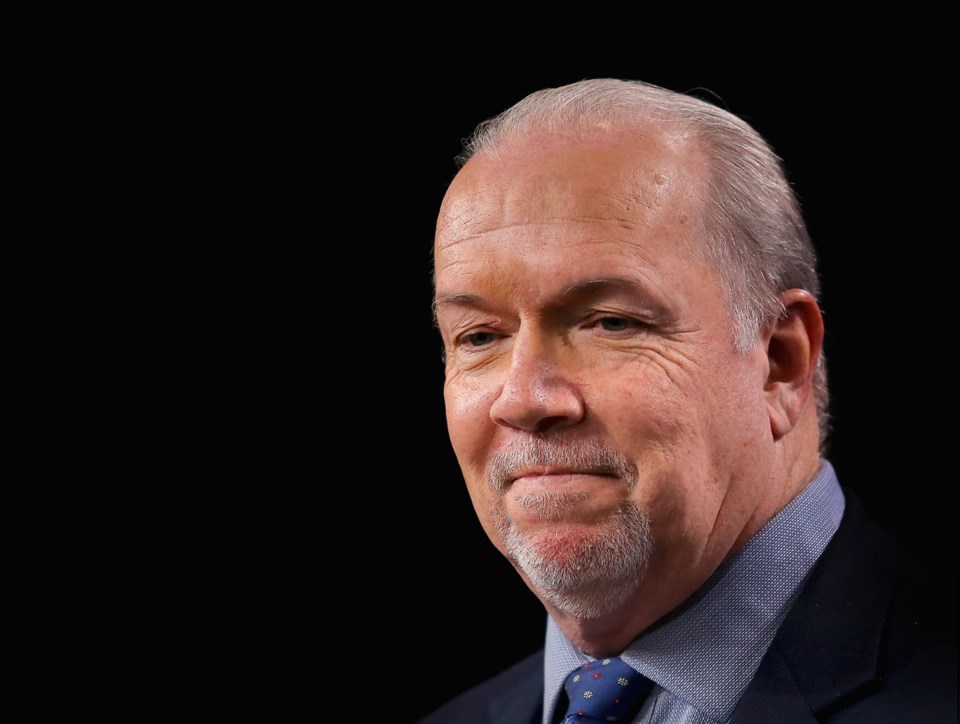The Union of B.C. Indian Chiefs is asking the premier to meet with Wet’suwet’en hereditary chiefs over a pipeline dispute in northern B.C. that’s become a political debate in Victoria.
Tsartlip Chief Don Tom, at a news conference at the University of Victoria on Wednesday, said the union supports the “peaceful actions” of young adults who on Jan. 21 staged an occupation in a provincial government lobby on Blanshard Street until they were removed 18 hours later by police.
The 12 Wet’suwet’en supporters, who call themselves Indigenous land defenders rather than pipeline protesters, demanded that the province respect the hereditary chiefs’ request to stop work on the Coast GasLink pipeline, and that Premier John Horgan meet with the chiefs face to face.
Some of the Wet’suwet’en supporters at the news conference said they plan to file complaints, claiming they were violently arrested at a peaceful sit-in, although Victoria police say no one was injured. One, Ta’Kaiya Blaney, claimed the protesters were treated with “hatred and racism.”
“This is a pressure-cooker situation we see all across Canada and British Columbia, where youth are rising, land defenders are rising, and John Horgan, Premier John Horgan has been hiding on this,” said Tom, vice-president of the Union of B.C. Indian Chiefs, which also called on Horgan to meet with the hereditary chiefs.
“I think his lack of leadership and absence on this issue is only going to, I believe, escalate matters and we are looking for a peaceful resolution.”
Speakers at the news conference representing Gitxsan and Wet’suwet’en and more said the issue is less about the pipeline and more about Indigenous rights, calling for the premier to “breathe life and spirit” into the adoption of the United Nations Declaration on the Rights of Indigenous Peoples, because “so far he hasn’t done that.”
The premier told reporters Wednesday that he met with the Wet’suwet’en hereditary chiefs last year.
“I know full well the views of the hereditary leadership,” said Horgan. “They told me directly. I don’t expect that that has changed since I last met with them.”
The premier said he has no control over the actions of the court and the RCMP.
The B.C. Supreme Court on Dec. 31 extended an injunction against protesters to allow Coastal GasLink access to the pipeline route. The RCMP began restricting access to the area where the court injunction applies on Jan. 13. Last year, the RCMP enforced a similar injunction and arrested 14 people at the site.
In answer to the hereditary chiefs’ calls to meet again, Horgan said he offered to connect by phone and was rebuffed. When he sent B.C. Indigenous Affairs Minister Scott Fraser to meet them, he said, the hereditary chiefs declined.
In a new attempt to de-escalate the tensions this week, Horgan appointed former Skeena-Bulkley Valley MP Nathan Cullen — whom he called “well respected in the region by Indigenous and non-Indigenous people alike” — as a liaison between the Wet’suwet’en hereditary chiefs, the province, RCMP and Coastal GasLink.
The premier said he believes the hereditary leadership understands that First Nations all around them see opportunity for prosperity and an end to systemic poverty as a result of the $40-billion LNG Canada project.
“It will create jobs, it will create business opportunities for new business startups within indigenous communities,” he said, adding other chiefs and nations along the corridor are sharing that message.
“I know that the hereditary leadership of some of the clans with Wet’suwet’en territory are opposed to the pipeline,” said Horgan. “I think that over time, a dialogue will allow us to get to a place where the Wet’suwet’en will see the courts have determined — the provincial government and the federal government have determined — that the permits are in order, this is a legitimate project that has massive benefits to B.C., particularly to indigenous communities, and through dialogue we’ll find a way forward.”
The proposed $6.6-billion Coastal GasLink pipeline is a key part of the $40-billion LNG Canada project and would span 670 kilometres across northern B.C., starting near Dawson Creek and extending to an export terminal at Kitimat, where an $18-billion liquefied natural gas export plant is being built. About one-quarter of the line crosses Wet’suwet’en territory.
Coastal GasLink, which has provincial approval to build the pipeline, has signed benefit agreements with all 20 elected First Nations along the pipeline’s path, but the Wet’suwet’en hereditary chiefs say the project has no authority to build on their traditional territory without their consent.
— With a file from The Canadian Press



